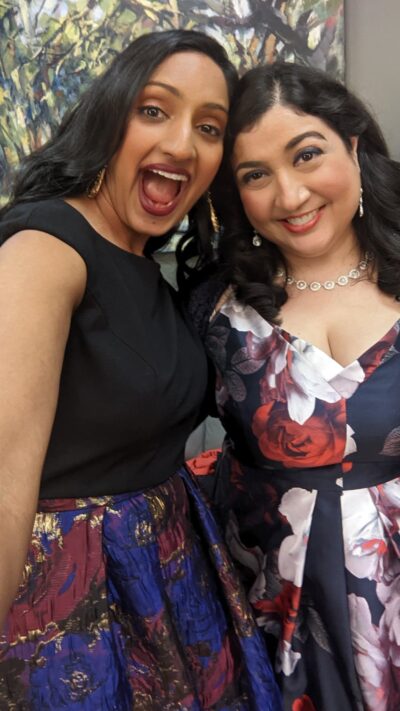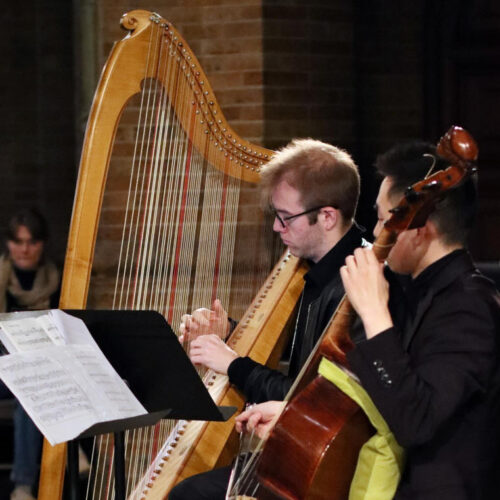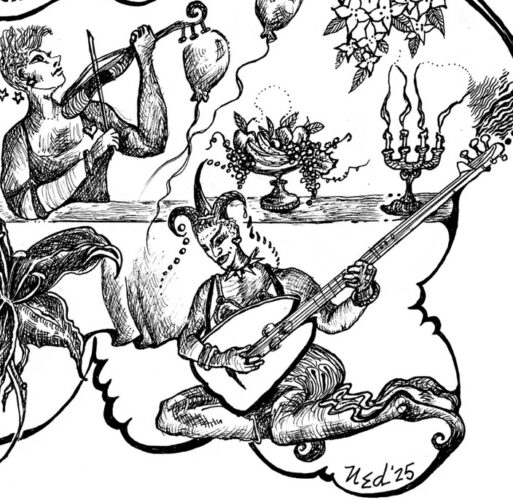by Natasha Gauthier
Published May 9, 2022
Maya Kherani remembers the moment she made the decision to add the adjective “Indian-American” to her artist bio. From the time she was a student, the young soprano felt the isolation that comes with being a visible minority working in early music—a genre where performers, administrators, boards, and audiences are, arguably, among the least diverse in classical music.

“For me, it was about representation,” Kherani says over the phone, in the middle of a stroll with her one-year-old daughter. “I knew what it was like to not have role models, never seeing anyone at school or at concerts who looked like me. I thought that if I could change that for one young person by being proud and open about my heritage, I should do it.”
Kherani is among a growing number of South Asian musicians, including soprano Sherezade Panthaki and tenor Asitha Tennekoon, working to promote more diversity in early-music programming while building their own impressive careers. Not surprisingly, Kherani, Panthaki, and Tennekoon all have similar anecdotes of being the only person of color on stage, sometimes in the entire venue, including the audience. Their colleagues include diaspora Indian-Americans, Indian-Canadians, and British Asians, as well as nationals from India, Sri Lanka, and other South Asian countries.
Maya Kherani, born in Indiana and raised in Texas, had a typical American childhood, with its own challenges. “I actually didn’t get into classical music until relatively late,” she says. “I loved musical theater and glee club. I did a lot of choral singing in school—I mean, it was Texas, so it was go big or go home. My parents put me in voice lessons because I asked. But I wasn’t too serious about it.” She was also subject to the parental expectations common to second-generation kids. “My parents are a chemist and a microbiologist. My whole family works in STEM. Music was something you did as a hobby, not a job.”
Kherani studied mechanical engineering at Princeton. “It was great because there’s no performance program at Princeton, so I could go to open auditions and sing in all these different ensembles but there was no pressure. I wasn’t competing with voice majors.” In her sophomore year, she was cast as Barbarina in a student production of Mozart’s The Marriage of Figaro. “That was the big introduction for me. I had never heard an opera before. I had never even prepared and sung an aria before.”
Kherani says she initially fell in love with opera for the theatrical aspects: the acting, the costumes, the character portrayals. In her junior and senior years at Princeton, she began studying voice privately. She auditioned for the master’s program at the San Francisco Conservatory of Music, and got in.
“I was so far behind. I had never done theory or ear training or any of the skills that everyone else had been doing since they were, like, five years old. On top of that, not only was I the only South Asian student, I was the only person of color in my whole cohort. I didn’t get cast in anything. I felt really intimidated.”
After SFCM, uncertain of her future, Kherani started an engineering doctorate at Stanford, but dropped out after just 10 weeks to pursue music full time. “I would say my parents were supportive, but also confused and anxious about my job security.” They didn’t need to worry. Even with the live-performance cancellations of the past two years, not to mention having a baby, Kherani’s career has taken off. Winning third prize in the 2021 Handel Aria Competition secured her reputation for that composer’s coloratura works, which she attacks with sparkling charm and fearless virtuosity. In December 2021, she made her Boston Baroque debut singing her first Messiah.
“Because my voice was light and flexible, I got pushed toward super-high coloratura roles like Zerbinetta (Ariadne auf Naxos) and Olympia (Tales of Hoffmann), but I never felt comfortable hitting those high E flats. In Handel, my voice feels at home. I have a theory that it has something to do with knowing Carnatic music (South Indian classical music). That approach to ornamentation and improvisation feels innate. I love Baroque music because there is freedom within structure. As a singer, you have so much agency.”
Her 2022-23 season includes Drusilla in Monteverdi’s Incoronazione di Poppea at this summer’s Aix-en-Provence Festival and several appearances with the American Bach Soloists. Like so many early-music performers, Kherani also enjoys life at the other end of the spectrum. She made her Glyndebourne Opera debut in February 2022 in the title role in Pay the Piper, a new youth opera by a team of four women composers. At Portland Opera, in March 2023, she’ll star in Thumbprint, a new opera by Kamala Sankaram based on the life of Pakistani human rights activist Mukthar Mai.
‘I found out people would pay me to sing that repertoire’
Kherani recently performed Bach cantatas with the Portland Baroque Orchestra alongside one of her idols, soprano and pedagogue Sherezade Panthaki. Panthaki grew up in India (Mumbai and Pune) in a Parsi family steeped in Western art, music, and literature.

“My parents both sang in choirs, and we had many classical recordings at home,” Panthaki tells me on a video call. Her precise, British-inflected diction instantly reminds me of all my own Indian-born relatives. “One of my earliest memories is being maybe two or three years old and wanting to listen to Bach’s B-minor Mass over and over, especially the Gloria. It lit me up to hear the trumpets, the tympani, and the choir. I thought it was the best thing in the world.”
Panthaki’s mother was an accomplished pianist and recognized her daughter’s precocious talent. Little Sherry was enrolled in Orff classes and began piano lessons at four. But singing always came as naturally as breathing. “My family says I was singing in tune well before I could talk. My mother would pick out tunes on the piano and teach me to harmonize.”
Panthaki attended a private Anglican girls’ school where tradition trumped post-colonial politics: Everyone sang Church of England hymns and participated in Christmas and Easter pageantry, even though “probably less than five percent of the students were Christian,” Panthaki recalls. It was at one of these holiday ceremonies that Panthaki realized she wanted to be a singer instead of a concert pianist. “When I was 13, I sang O Holy Night at the Christmas service. India being India, there were about 2,000 people in attendance. I could see and feel the emotion in a way you don’t get from behind an instrument. It was visceral. I had an epiphany.”
Panthaki had another, more private reason for pursuing a career in music: her mother had died when she was eight. Music always felt like a connection to her memory. And she knew she would have to leave India to pursue her ambitions, noting that “there’s no IIT (Indian Institutes of Technology) for Western music.” After attending a college fair in Mumbai, she chose West Virginia Wesleyan College in Buckhannon. “I liked the program, but I’ll be perfectly honest: I tried to get the most financial aid I could.”
Panthaki had never been to the U.S. when she arrived as a freshman. “When you come as an immigrant, you try to assimilate. It was a small town and I felt quite safe, despite being vastly in the minority. I was a little homesick of course, but I loved being in an environment with like-minded peers. I was so excited that I could just walk from my dorm to the practice rooms at 2 a.m. if I wanted, and nobody would say anything.”
During graduate studies at the University of Illinois Urbana-Champaign, and under the mentorship of harpsichord teacher Charlotte Mattox Moersch, Panthaki’s lifelong love of sacred Baroque repertoire gelled into a viable career choice. “Singing oratorios and cantatas suited me,” she says. “I felt I had come home, like I had an instinct for it. I love Verdi and Mahler, but it never felt natural. And then I found out people would pay me to sing that repertoire and I could make a living.”
Panthaki is known for her clear, glowing top range, elegant phrasing, and highly developed sense of drama and grandeur. Her beloved B-Minor Mass has become a specialty, along with the Bach Passions. As an educator, she has coached and taught master classes, opera and choral workshops at universities and conservatories all over the U.S., most notably at Yale.
‘I’m a Colonial Success Story!’

Sri Lankan-Canadian tenor Asitha Tennekoon had a similar experience as an immigrant music student. Like Panthaki, he had an early introduction to Western classical music. Born into Colombo’s tight-knit Christian community, Tennekoon attended a private Anglican boys’ school renowned for its choral program. Like Panthaki, Tennekoon was taught piano at home; he credits his school’s choirmaster with encouraging his love of singing and developing his affinity for Renaissance and Baroque sacred music. But while he is grateful for that education and training, he would later come to question the supremacy accorded to Western traditions, even at the expense of Sri Lanka’s own rich cultural history and artistic expression.
“I had the experience of growing up surrounded by all these different, amazing cultures. But in Sri Lanka, and especially in our (Christian) community, anything European or British was automatically viewed as better.”
Tennekoon moved to the U.S. in 2007 to study voice at Indiana University. Again like Panthaki, moving from a large, cosmopolitan, multicultural city and finding himself a minority in a small American college town like Bloomington was a shock. Tennekoon describes both overt and subtle incidents of racism, like the time he was singing Tamino, the hero in Mozart’s The Magic Flute. “A board member at the reception asked me very sincerely why I hadn’t been cast as Monostatos instead”—the opera’s villain, where the blackness of the character’s heart, as a racist stereotype, is implied by the blackness of his face.
Unsure of his future in classical music and needing to earn a living, Tennekoon returned home to Sri Lanka after graduating. Eventually, he could not deny music’s pull; he moved to Toronto in 2014 to study at the Glenn Gould School. More confident, he began building a versatile, omnivorous career while starting to ask thoughtful questions about diversity and representation in his field.
Today, Tennekoon is one of Canada’s leading Bach Evangelists. Before the COVID shutdowns, he had a busy schedule of cantata and oratorio work with ensembles like Toronto’s Tafelmusik and the Indiana Baroque Orchestra. A light, agile, lyric tenor with magnetic acting skills, he’s also busy in opera, with a strong track record of contemporary premieres alongside the more usual Mozart, Bel Canto, and French operetta roles.
Sometimes Tennekoon is asked to perform something “Indian” as an encore, which can lead to some awkward exchanges.
“I always have to explain that no group or culture is a monolith. It’s actually funny to me that colonialism forced itself on all these other cultures—the goal was to create a generation of brown Europeans—and now people seem surprised that this is what I sing. I’m like, ‘I have what you left me’. I’m a colonial success story!”
He says he is just now figuring out how to reconnect with the Sri Lankan part of his musical heritage, “because I want to, not because it’s expected. But what I’ve come to realize is that as a Sri Lankan singer, whatever music I’m singing—Bach or Mozart or contemporary—becomes Sri Lankan music.”
‘Early music is very incestuous’
Panthaki, Tennekoon, and Kherani are all are trying to change the early-music experience for future generations, trying to advance equality and social justice.
With Filipino-American choral conductor Arianne Abela, Panthaki co-founded the Kaleidoscope Vocal Ensemble, a professional chamber choir of nine ethnically diverse singers that performs both early and new music while undertaking outreach activities with audiences and students, especially in communities of color.
In Toronto, Tennekoon is a co-founder of Amplified Opera, which produces new works by composers and librettists from underrepresented communities, and hosts workshops, conversations, and other events to explore challenging themes in opera such as cultural appropriation, misogyny, and colonialism.
During her COVID downtime, Kherani started the Facebook page South Asians in Western Classical Music with Colorado-based Baroque and modern violist Vijay Chalasani. From just a handful of members, the group has grown to over 300 people from all over the world, including several early-music specialists. True to her engineering background, Kherani has even pulled together a public, searchable member database to help support more diverse hiring and casting.
“Early music is very incestuous,” she says. “Even more than opera. There are no open auditions, or they’re very rare. Conductors hire who they already know. It’s a huge problem.” Kherani’s database intends to break that cycle: no more excuses about wanting to engage more non-white musicians but not being able to find any.
For Panthaki, the Facebook group can also help young musicians of color find mentors, something she feels is key to a more diverse future for early music. “Representation is super important,” she says. “If we want people to consider (early music) as a career, they need to see themselves reflected. And not just on stage. This can be such a minefield, especially if you’re a person of color. Finding mentors who look like you and know what you’re going through and can help is crucial.”
For those early-music organizations who don’t feel ready to have difficult discussions about representation and systemic barriers—or worse, deny their existence—Tennekoon has no problem bringing straight talk to their doorstep. In the fall of 2020, he participated in an online panel discussion on lack of diversity in historically informed performance, hosted by the Toronto Bach Festival (disclosure: I was the moderator). Although the organizers acknowledged the need for change, the discussion has not led to any measurable changes in TBC’s hiring practices to date. No soloists or ensembles of color appeared in the lineup for the May 2022 edition of the festival.
“It was disappointing to see that, but what I’m more disappointed with is that I wasn’t surprised,” Tennekoon says. “I think what we’re seeing, especially post-COVID, is that classical music organizations in general, and especially early music, are playing it safe. It makes me feel like as performers of color, it’s expected that we have to wait until organizations are ready and comfortable to have these conversations. But we can’t wait. We don’t have to wait.”
Panthaki echoes this sentiment: “The work we’re all doing is about making sure there is a space here for anyone who wants to be in it.”
Natasha Gauthier is a bi-racial, South-Asian-Canadian classical music critic and journalist based in Ottawa. She writes frequently for Opera Canada and La Scena Musicale, and is the former classical critic for The Ottawa Citizen. She has a BA in Journalism from Concordia University in Montreal, where she also completed advanced studies in piano and harpsichord. She has been a passionate advocate for diversity and representation on stages, staffs and boards for more than 25 years.




